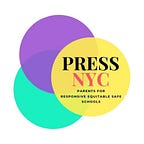PRESS NYC Responds to Chancellor Banks’ “Vision for Transforming and Building Trust in NYC Public Schools”
PRESS NYC was heartened to hear a number of ideas Chancellor David Banks uplifted in his remarks on March 2, 2022:
- reenvisioning students’ experiences to be more meaningful;
- ensuring our schools prepare children to engage actively in our communities and our democracy;
- overhauling literacy instruction using evidence-based methods that serve all students;
- ending the chokehold of standardized testing and embracing performance-based assessment;
- prioritizing children’s well-being through healing-centered, trauma-informed practices;
- engaging authentically with families, especially those too often pushed to the margins;
- committing to anti-racist, culturally responsive and sustaining education;
- and reducing bureaucratic barriers to responsive innovation by teachers and school leaders.
As Parents for Responsive, Equitable, Safe Schools, we are long-time champions of much of what was presented.
There were also some concerning narratives and omissions we feel compelled to address.
It was unsettling to hear Banks reinforce the biased, deficit narrative that our underfunded, poorly ventilated schools are safer than children’s homes in a system with 85% BIPOC students. When the Chancellor highlighted the very real concern for the safety of LGBTQ+ students at home, but did not address the impact of racism, sexism, homophobia, transphobia, anti-immigrant harassment, and other forms of harm happening in schools themselves, that negated the lived reality of many children and their families. That is not the way to build trust.
Similarly, Chancellor Banks celebrated and took credit for the jump from 65% attendance on January 3 to 89% on March 1, without acknowledging the numerous reasons for those absences. Students either had COVID, or their families were trying to keep them safe during a surge — something he and the Mayor neglected to do by requiring baseline testing after Winter Break or offering remote instruction for a week or two in the midst of an Omicron-created staffing shortage. And to celebrate when 11% of students, meaning around 90,000 children, were not in school in early March seems a bit self-serving. Again, this is not an effective way to build the trust needed to transform our schools for the better.
Hearing the Chancellor cast schools in neoliberal terms, as “essential to the…economy” and “the engine of the American dream,” was troubling, particularly at a time when so many institutions have failed to ensure that mythic dream is accessible for the majority of folks. We believe in unconditional positive regard for all children, reflected in the Black Lives Matter at School principle of “Collective Value,” meaning that our babies deserve schools where their well-being, growth, and humanity matter for their own sake, unconditionally. If the Chancellor and Mayor are sincere about wanting to “help our students and staff heal,” they must center schools as spaces focused on helping children thrive, not on their role in propping up a capitalist system that ultimately benefits corporations and the wealthy at the expense of nearly everyone else.
In truth, we hope one day in the not-very-distant future, families, students, and teachers in our city will not be subject to mayoral control. We don’t believe any school system, but certainly not one as large and complex as NYC’s, should be run entirely by one individual. Mayoral control has not improved accountability, which is why we look forward to a democratic, rights-holder-driven school governance model that is accountable to our communities, and that will allow those closest to the impact to have the largest say in how our schools function.
To be clear, we wholeheartedly support transforming and building trust in NYC Public Schools; what we cannot support and won’t tolerate is any continuation of the gaslighting that defined the last administration’s approach to stakeholders. The new Chancellor must be aware that he is not starting at neutral, but is entering the story at a moment when everyone involved with the NYC DOE bears scars that have not healed, whether from the pandemic, or from years and decades before that.
Over the next few weeks, our diverse caregiver, educator, and advocate collective will be releasing a series of pieces responding to the topics and solutions raised in the Chancellor’s statement. We will keep it fully real: We’ll celebrate what we’re energized by, reject what we find harmful, and problematize the rhetoric that rings hollow until reinforced through actions.
